Book contents
- Frontmatter
- Contents
- Preface
- Abbreviations and forms of reference
- Introduction
- PART I WILLIAM OF TYRE AND THE WRITING OF THE ‘HISTORIA’
- PART II WILLIAM OF TYRE AND THE MEANING OF THE ‘HISTORIA’
- 5 The monarchy
- 6 Regnum and ecclesia
- 7 The papacy
- 8 The Byzantine empire
- 9 The war against the infidel
- Conclusion
- Bibliography
- Index
- Cambridge studies in medieval life and thought
5 - The monarchy
Published online by Cambridge University Press: 09 October 2009
- Frontmatter
- Contents
- Preface
- Abbreviations and forms of reference
- Introduction
- PART I WILLIAM OF TYRE AND THE WRITING OF THE ‘HISTORIA’
- PART II WILLIAM OF TYRE AND THE MEANING OF THE ‘HISTORIA’
- 5 The monarchy
- 6 Regnum and ecclesia
- 7 The papacy
- 8 The Byzantine empire
- 9 The war against the infidel
- Conclusion
- Bibliography
- Index
- Cambridge studies in medieval life and thought
Summary
In the preceding books we have, after a fashion, described the remarkable deeds of those brave men who for eighty years and more have held dominion in our part of the East and in particular in Jerusalem.
Thus William of Tyre, writing in the preface to Book XXIII of the Historia, surveyed his work. The deeds of rulers, especially the kings of Jerusalem, had featured prominently. The early books had recorded the events of the First Crusade, giving the limelight to its leaders. The Crusade over, it had been the same men, Godfrey, Baldwin of Boulogne, Raymond, Bohemond and Tancred, who ruled in the territories that had been won, and so the transition from the description of the Crusade to the description of what followed worked smoothly. In his Prologue, William had spoken of the Historia as a gesta regum, and so in large measure it is. But, as he went on to say, writing of the deeds of kings poses moral problems for the historian: should he tell the truth or engage in flattery? After all, descendants of these men might read what he had written and take offence.
Part of William's intention was to inspire people to renewed efforts by recounting the achievements of past rulers. These men had had a role to play in the unfolding of divine providence, but William made some attempt to give them individual characteristics and not to portray them simply as stereotypes.
- Type
- Chapter
- Information
- William of TyreHistorian of the Latin East, pp. 61 - 84Publisher: Cambridge University PressPrint publication year: 1988

